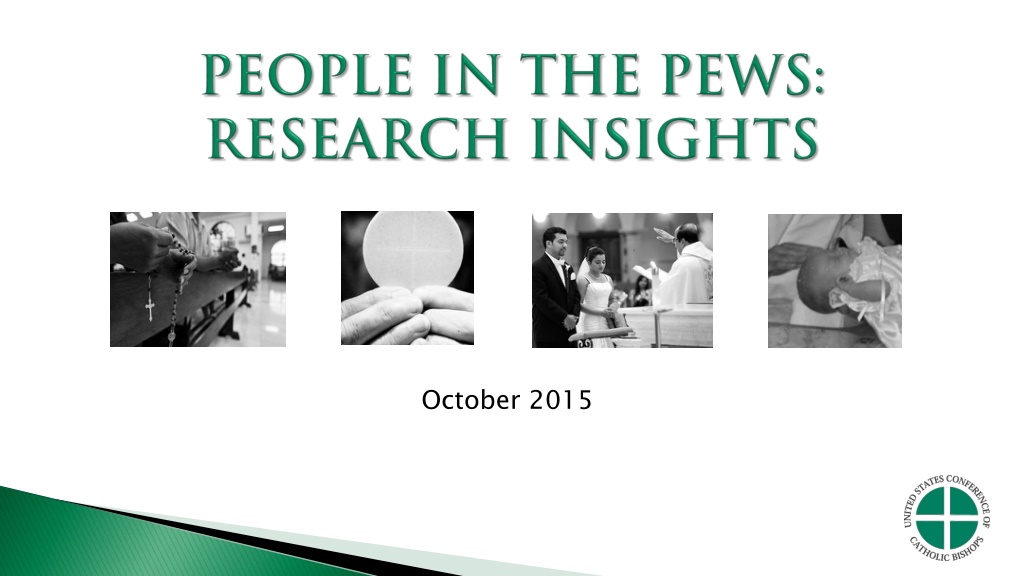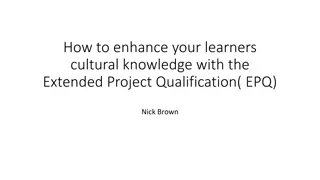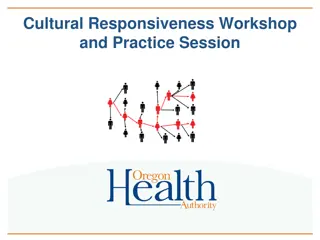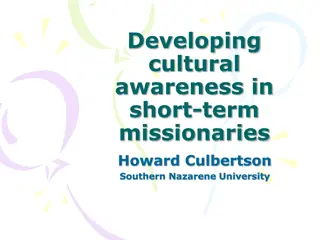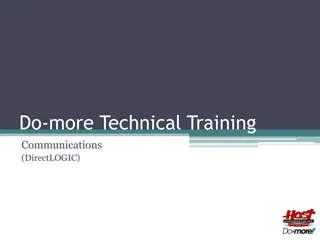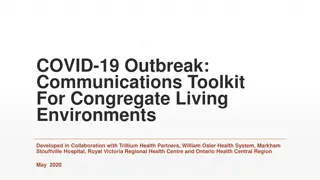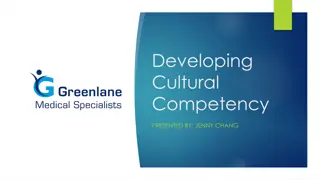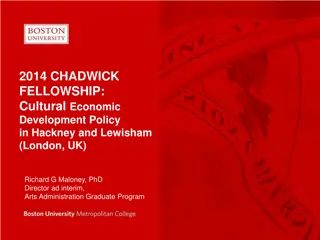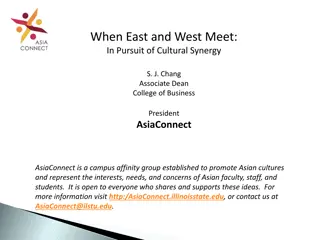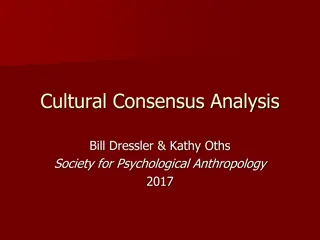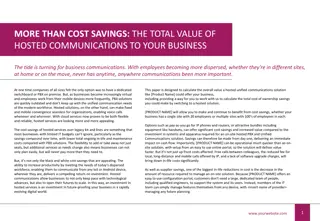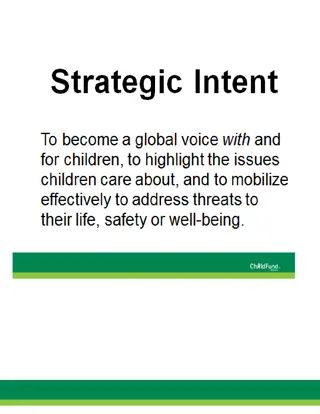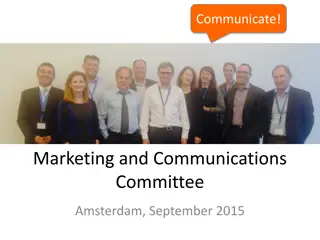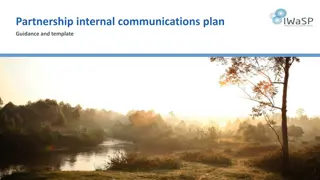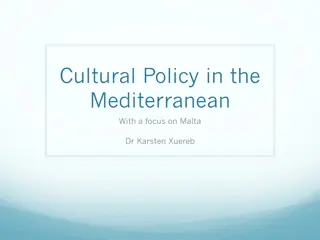Developing Effective Communications Strategies through Cultural Research
Developing effective communications strategies involves researching assumptions and cultural challenges that influence human life values. The research delves into understanding various audience segments, emotional needs, and barriers through qualitative and quantitative approaches. Segments like Hispanic Parishioners and Young Parents were studied over three and a half years to identify key findings for each group.
- Communications strategy
- Cultural research
- Emotional needs
- Audience segmentation
- Qualitative research
Download Presentation

Please find below an Image/Link to download the presentation.
The content on the website is provided AS IS for your information and personal use only. It may not be sold, licensed, or shared on other websites without obtaining consent from the author. Download presentation by click this link. If you encounter any issues during the download, it is possible that the publisher has removed the file from their server.
E N D
Presentation Transcript
In order to develop effective communications strategies the priority plan laid out a course to research the assumptions and cultural challenges that work for or against the acceptance of the intrinsic value of human life.
Archbishop Thomas Wenski Domestic Justice and Human Development Bishop Richard Malone Laity, Marriage, Family Life and Youth Bishop Oscar Cant International Justice and Peace Archbishop William Lori Ad Hoc Committee for Religious Liberty Archbishop Leonard Blair Evangelization and Catechesis Cardinal Se n O Malley Pro-Life Activities
Researching assumptions and cultural challenges to develop effective communications strategies required better understanding our people in the pews. Used a right brain / emotional research approach in order to: Identify important research audiences/segments. Explore emotional needs, barriers and rationalizations. Develop communications strategies based on findings.
Two Types of Research: Qualitative Research: Identify specific research audiences and requirements. Screen to generate qualified respondents. Conduct in depth interviews with small representative samples: Using visualization and repetition. Probing for overarching psychological themes. Quantitative Research: Test themes from smaller audiences / segments on large national samples.
Active Parishioners Diocesan Directors Parish Priests Focused Segments: -Hispanic Parishioners -Young Singles -Young Parents -Missionary Disciples Research segments were conducted in various regions of the over the course of three and a half years. country,
A detailed series of emotional needs, barriers and rationalizations were identified for each of the various research segments. This summary will only touch on several key findings for each segment. Phrases noted are often-repeated, direct quotes from respondents.
January 2011 Cincinnati Irvine/Orange Segment demographics: 50% men, 50% women Ages 24-56 30% Hispanic 10% African American Three+ Masses per month. Scored points for general parish activities.
Motivations: Their Catholic World is their Parish. Bonded to people of the parish. Sense of Catholic Pride; even a Catholic Tribe: Being Catholic is part of their Identity. Proud to be Catholic (greatness of their faith). Guide for their lives. Something bigger than themselves.
Motivations: Uplifted by greatness of their faith. Strengthened by being more like Jesus. Serving others is a duty. Serving others is emotionally fulfilling.
Challenges: Very little mention of sin. Goofy Rules. Following the Rules. If they don t understand the why behind the rules, they just set them aside.
Challenges: Judgment is huge. Respondents avoid people and causes that judge others. Concerns over Church getting into politics. Politics can mean any divisive social issue (abortion, immigration, redefining marriage, etc.). Respondents avoid politics and confrontations.
View of two Camps (Pro-Life vs. Social Justice)? Generally not aware of a divide. Significant that Pro-Life vs. Social Justice was not raised. Instead, they see many opportunities to engage both areas: Church is seen as a large umbrella. Both PL and SJ efforts should be seen as the work of the Church.
Their Catholic world is greatly impacted by relationship with parish priest and how he communicates: Good priest communication skills: Remembers their names. He listens. Tells stories. Makes Mass a celebration. Poor priest communication skills: Makes them feel judged. Seems aloof. Sounds like a politician.
Recommendations from Respondents: Explain the Rules : they want and need to understand the why. The power of being asked: an affirmation or calling. Use stories. More opportunities for engagement. Broad vision, not camps.
Diocesan Social Justice Directors: New Orleans, July 2011 Diocesan Pro-Life Directors: Atlanta, Aug 2011
Motivations: Social Justice and Pro-Life Directors feel deeply called to do God s work.
Challenges: Research found two Approaches in conflict: 1) Outlawing abortion is the first priority. 2) Pro-life, but acknowledge other important issues to address. Where this conflict exists: Favoring one approach automatically excludes the other. Someone feels betrayed or marginalized. My work is not appreciated as much as __________
Recommendations from Respondents: Want to better understand Church teachings. Opportunities to work collaboratively, person to person. Explore non-legislative activities for collaboration. Emphasize people working for the Church, not causes in conflict. Leadership of the bishops.
December 2011 Five different dioceses: Arlington-Washington-Baltimore region San Antonio-Austin region
Motivations: Their parish is very much their world: See themselves as father of a family. Feel responsible for the welfare and harmony of the parish family. Want to teach principles and applications of faith.
Challenges: Fear involvement in politics will contaminate the mission. Politics can mean any topic understood to be divisive. They feel called to preach the Gospel, not be politicians. Pro-Life and Social Justice issues can be divisive. Want to see PL and SJ goals accomplished in harmony, under the banner of the Church.
Recommendations from Respondents: Teach the moral principles that parishioners need to hear. Stay away from politics. Emphasize our mission is Church-focused rather than cause-focused. Stress the value of PL and SJ working collaboratively. It comes back to the Gospel. Leadership starts with the bishops.
May 2012 Chicago San Diego Scored points for general parish activities. 50% interviews in English. 50% interviews in Spanish.
Motivations: Their Catholic world is their parish. Being Catholic is integral to their image of themselves. Focus is on the family. Faith, family and charitable work is interwoven in keeping them engaged. Church is sanctuary : physically and emotionally. Emphasis on a personal relationship with God: Strong personal devotions.
Challenges: Can reach God directly (less emphasis on Church as institution). But want God s house open (the church building). Concerns over Church getting into politics. Priest abuse scandal has been a betrayal, and not dealt with. Feeling unaccepted themselves has a huge impact. See negative judgment of others as very harmful. Acceptance of same-sex relationships or marriage related to their own experiences of welcome or rejection, and their desire to accept others who feel unwelcomed. Like other segments of receivers, they tend to pick-and-choose regarding Church teachings.
Recommendations from Respondents: Explain the Rules. They want and need to understand the why. The power of being asked. An affirmation or calling. Use stories. Keep churches open. More Masses, resources in Spanish. Address the scandal and apologize. Stay away from politics.
September 2012 Denver White Plains Young Parents: Young Singles: Scored points for general parish activities. No longer living at home with parents. Mixed level of parish activities.
Motivations: Young Parents engage the Church: For how they want to feel about themselves as parents. To shepherd their children into the Church. Young singles engage the Church: With a remarkable blend of pride and ambivalence.
Challenges: They feel completely Catholic, even while disagreeing with the Church. Pope is entitled to his opinion. Simplify the Rules to: Be nice to everyone ( The Golden Rule ). Never judge. When teachings or communications conflict with their perceptions, they tune out: Agree to disagree. Priest abuse scandal has been a betrayal, and not dealt with. Yet, while critical of the Church, can t imagine life without the Church.
Recommendations from Respondents: Explain the Rules. They want and need to understand the why. The power of being asked. An affirmation or calling. Use stories. Address the scandal and apologize. Stay away from politics. Avoid seeming to be judgmental. Hate the sin, love the sinner means hate the sinner.
May 2013 Camden-Philadelphia region Denver Specifically identified for: Mass attendance: four+ times per month. Strong personal relationship with Jesus. Transition to intense faith. Joyful fidelity to Church teachings. Daily prayer, frequent Sacraments. Commitment to ministry outside parish.
Motivations: The real presence in the Eucharist is central. Focused on faith and teachings. Don t see goofy rules but beauty and freedom. They want to deeply understand the why behind teachings. Wished others did as well. Involved in parish, but focused beyond. Desire to share the Gospel (missionary discipleship).
Motivations: On transitions to becoming more fervent : Catching the fire. New understanding of the Eucharist. Traumatic event. Contemplation and prayers answered. Being invited to: Moving event / experience. Small faith group / prayer group. Work or lead.
Challenges: Feel a lack of support. Priests not providing inspiration and energy. Failure to teach the Faith. Failure to reach most parishioners. Lack of connection, interaction at the parish.
Recommendations from Respondents: Emphasize the Eucharist. Form priests to be joyful, inspirational. Explain the teachings and use stories. Help other parishioners to encounter Jesus. Emphasize a tribe that is faith-focused, not just activity-focused. Being invited is an affirmation or calling. Provide training in evangelization. More Jesus in PL and SJ activities. Want to be challenged / commissioned.
June 2014 Quantitative testing of the Qualitative (emotional) research. Nationwide survey: Tested communications to all segments of people in the pews. Exceptionally strong confirmation of results from earlier qualitative interviews. Research provides a framework for better reaching/teaching various audiences/segments, based on: Motivations. Religious Education Approaches. Potential Messaging Themes.
Challenges: No clear link between Jesus and the Church. Disconnect between example of Jesus and the teachings of the Church. Poor or no catechesis. Weak spiritual development and limited desire for further spiritual growth. Abuse issue surfaced as needing attention.
Opportunities: God s Love is a positive and overpowering theme. Where Jesus is central, engagement is increased. While strong feelings of rejection and judgment are related to infrequent Mass attendance, strong feelings of nurture and community are related to regular Mass attendance.
While we are still in the process of delving into the data The communications research to date has uncovered and quantified new findings as well as confirmed other studies on how to more effectively reach and motivate Catholics to embrace the full vision of what it means to Catholic. Possible messaging/themes can be identified to reach particular audiences.
The research work extended into the second conference-wide Priority Initiative on the Life and Dignity of the Human Person, which was approved by the full body of bishops in November of 2012. The 2013-2016 plans called for ongoing leadership of the Bishops Working Group in: The continuation of the research communications project. A major convening of Catholic leaders.
The priority plans call for a major convening to challenge and motivate Catholic leaders to embrace the full vision of what it means to be Catholic and fully engaged in the Church s mission of evangelization, and to proclaim the Church s vision of the human person. The Bishops Working Group has seen the research and the Convocation as closely connected. The Convocation will be greatly informed by this research.
Last November, based on the research findings and the priority plan mandate, the Bishops Working Group announced the title for the Convocation: The Joy of the Gospel in America: A National Convocation of Catholic Leaders Scheduled from July 1-4, 2017 in Orlando, Florida.
The Joy of the Gospel in America: A National Convocation of Catholic Leadersis inspired by Pope Francis Evangelii Gaudium and brings together Catholic leaders - including emerging leaders - for a unique experience of the Body of Christ. Led by the bishops of the United States, the event will emphasize a deeper encounter with the Lord, the vision of the human person in the light of Christ, special concern for those who are poor and marginalized, missionary discipleship in challenging times, and the continental mission of the Church in the Americas. Participants will return home renewed and reenergized to share the Gospel and form disciples, with exciting connections and resources for ministry and an historic experience of what it means to be Catholic.
Participants in the Convocation should expect Unique fellowship and interaction with bishops and other Catholic leaders across the country, including continental leaders as well (Canada and Latin America) Vision and teaching of Saint John Paul II, Pope Benedict XVI and Pope Francis Opportunities for prayer, spiritual growth and enrichment, education and formation, discussion, networking, and collaboration Expert presentations and workshops by bishops and other prominent leaders July 4 Mass for the Fortnight for Freedom and public Eucharistic Procession Social events with top Catholic entertainers Occasions for family participation and leisure
The USCCB priority plans envisioned a gathering of 3000-5000 Catholic leaders. Leaders are both official leaders within the Church people occupying diocesan or parish offices, educators and directors but also those who exercise leadership in apostolic efforts outside of the diocesan structure (both local and national), for example: Catholic leaders from various segments of the laity such as those in higher education, business and cultural leaders, as well as Catholic young adults and emerging leaders. With a central focus on mission and evangelization, the Convocation will not be a trade show for professional development of Church staff. The Convocation is focused on forming Catholic leaders and examining current practices in an effort to better communicate the Church s message.
The role of each bishop in identifying these leaders will be very important given the limited number of spaces at the Convocation. Most participants will be invited by their bishop and attend as a member of a diocesan delegation. Others will be invited as key leaders of Catholic organizations, apostolates, movements and ministries.
We anticipate a registration fee of $400 per person. Adding that to a hotel room fee of $119/night and $400 for travel and $200 for meals and other expenses, we estimate a total per-person-cost of roughly $1480/leader. Some diocesan leaders may already have this budgeted, as a number of USCCB-sponsored annual gatherings for diocesan leaders will be folded into the Convocation (such as the annual Catholic Social Ministries Gathering for diocesan social justice leaders and the annual Pro-Life Directors Meeting for diocesan pro-life directors). There is the possibility of other similar annual gatherings doing the same. Dioceses may consider approaching local donors, foundations or associations to assist with underwriting the costs for their diocesan delegation.
Bishops are asked to begin thinking about the membership of the diocesan delegation that might join them at the Convocation. The Bishops Working Group has proposed several visions for possible diocesan delegations: Diocesan Leadership focused delegation Parish Leadership focused delegation Combination of the two including leaders in apostolic efforts
Team of 10 Bishop Diocesan Cultural Diversity rep Diocesan Justice & Peace rep* Diocesan Respect Life rep* Diocesan Family Life rep Diocesan Evangelization rep Diocesan Education rep Youth/Young Adult rep Communications rep Emerging leader rep Team of 15 Bishop Diocesan Cultural Diversity rep Diocesan Justice & Peace rep* Diocesan Respect Life rep* Diocesan Family Life rep Diocesan Evangelization rep Diocesan Education rep Youth/Young Adult rep Communications rep Emerging leader rep Emerging leader rep Key pastor rep Key pastor rep Key parishioner rep Key parishioner rep Team of 20 Bishop Diocesan Cultural Diversity rep Diocesan Justice & Peace rep* Diocesan Respect Life rep* Diocesan Family Life rep Diocesan Evangelization rep Diocesan Education rep Youth/Young Adult rep Communications rep Other diocesan leader rep Emerging leader rep Emerging leader rep Key pastor rep Key pastor rep Key pastor rep Key pastor rep Key parishioner rep Key parishioner rep Key parishioner rep Key parishioner rep *Many Diocesan Respect Life and Justice and Peace reps will have this budgeted already
